|
Which Countries Offer the Highest Yield for the Lowest Risk? In today’s global economy, it’s fairly easy for Main Street investors to choose funds that specialize in countries around the world. The benefits of country diversification include: exposure to different economies and their growth potential, mitigation (somewhat) of risk, and higher yield. Each year, we line up GDP growth expectations, debt to GDP and other factors to determine which countries offer the best risk/reward. See below for 5 countries that are ranking at the top of the pack, one that has fallen off of our radar and two that are higher risk than most of us realize. 2 Countries With More Risk Than Investors Realize: the U.S. & Canada Since the pandemic and the aftermath of escalating inflation, almost all countries have increased their debt and are now having to raise interest rates. That can be a problem, particularly if there is a lot of corporate debt in the country. The IMF issued an alert on Jan. 31, 2023, writing, “[The] build-up of risk in the corporate sector and a doubling of funding costs for even the safest issuers could pose serious problems for many economies and their financial systems.” The U.S. was listed as #9 of the developed world countries that were at risk, behind Portugal, Norway, Greece, Spain, Iceland, New Zealand, Austria and Italy. Canada was #12 on that list. In my country analysis this year, I included financial instability risk rankings from the IMF report. (If you’d like that graph, email [email protected] with Country GDP Debt Graph in the subject line.) It’s important to remember that we are a global economy. A ripple in the developed world can become a tidal wave in the developing world. In other words, all equity-based investments are at risk. High leverage and rising interest rates create a great deal of problems for fixed income products, too. For these reasons, we are overweighting an additional 20% safe in our sample pie charts (limiting exposure to equities) and underweighting mid- and long-term bonds. (We’ve been suggesting that Main Street investors have limited exposure to low-yielding mid- and long-term bonds for a decade now.) You can personalize your own sample pie chart using our free web apps. Email [email protected] with FREE WEB APPS in the subject line. Fixed income investors are finally being rewarded for their risk, but navigating between the new opportunities and the legacy debt (which is plummeting in value) is tricky. I address this in my 2023 Bond Strategy blog. (Click to access.) 5 Countries With Attractive Risk/Reward Scenarios Australia Ireland Peru Indonesia China FYI: Chile is No Longer on Our Hot Country List And here is more color on each country. 5 Countries With Interesting Risk/Reward Scenarios The U.S. has a lot to offer investors in terms of leading multinational companies. Canada is rich in natural resources, including oil sands. I’m not suggesting that we jettison Apple, Google, Amazon and other large multi-national companies from our investing plan. These trillion-dollar companies offer a solid foundation. For most of us, however, almost all of our exposure is in one or both of these countries, and in only very large corporations. Additionally, there is a great deal of difference between high-growth, low-debt companies, and the high-debt, slow-growth companies that are concentrated in value funds. Many U.S. large-cap growth companies are still experiencing very high valuations. Legacy value companies have a great deal of leverage. Over half of the S&P500 is at or near junk bond status. What we’re offering in this blog is a way to diversify away from the low-yielding value funds and into international equities, many of which offer double or triple the yield. Australia Australia is a country that is rich in natural resources. After the Great Recession, Australian equities more than doubled in value in under two years. (It took the Dow Jones Industrial Average over six years to crawl back to even.) The post-recession building boom typically puts natural resources in high demand. While 2023 could see Australia’s economy slow to 1.9% GDP growth, if there is an economic recovery in 2024, Australian companies could soar again. In the initial stages of economic weakness, almost all international equities will go down before the decoupling occurs. The U.S. is expected to experience at least a mild recession, so stocks worldwide could be under pressure. For that reason, if we don’t already have exposure to an Australian ETF, it’s a better idea to dollar-cost average into the holding, rather than to just slam-dunk a purchase to fill up a slice of the pie chart. In addition to the capital upside, many Australian ETFs offer a far more attractive yield than their U.S. and Canadian counterparts. As you can see in the chart below, the iShares Australian ETF (symbol: EWA) is currently offering a yield of 6.05%, compared to 2.3% in the U.S. and Canada. According to the IMF, Australia has a much lower risk of financial instability than Canada and the U.S., as well. Ireland Ireland is benefitting from being the European tax haven for a lot of technology companies, including Google and Apple. The country was in dire straits during the Great Recession. It required IMF assistance and a bank bailout. However, since then, it has risen to having one of the highest GDP per capita in the world, at $107,000 per person, compared to $78,000 in the U.S. and $60,000 in Canada. Ireland’s GDP growth was a whopping 14% in 2021, 9% in 2022, and is expected to be one of the highest in the world, at 4.0% in 2023. The yield on the iShares ETF (symbol: EIRL) is only 1.24%. However, this is a country that is carrying lower risk than most of the developed world. Again, if we don’t already own this ETF, it’s a better idea to dollar-cost average into the holding, rather than to just purchase the slice all at once. Peru Copper has been coined as “the new oil” by Goldman Sachs because the metal is essential in the transition to a new energy economy. Peru is the 2nd largest producer of copper in the world, behind Chile. The country also has some unique food/nutrition products that are desired around the world, including quinoa, camu camu, maca and cacao. There is political unrest in Peru that could spill over and impact the economy. However, at this time, Peru is expected to have 2.6% GDP growth in 2023 and 3.2% in 2024. When copper is hot, as it was in 2021, Peru’s GDP catches fire, too. In 2021, Peru’s economy grew by almost 14%. Investors are receiving a yield of 5.46% for investing in the iShares Peru ETF (symbol: EPU). Indonesia Indonesia benefits from the growth of China, and is also energized from the higher prices of oil and gas. The country is the #1 producer of nickel – a rare metal that is central to lithium ion batteries and other clean energy products. Indonesia’s GDP is expected to grow at 5.0% in 2023. FYI: Vietnam’s economy is predicted to grow 6.2% in 2023. It’s difficult to invest in a Vietnam-based ETF, which is why the country is not included here. China China was heavily impacted by COVID in 2022, but is expected to have a stronger 2023, with 5.0% GDP growth. The country agreed to U.S. audits of its publicly-traded companies. So, in addition to having a strong economy, investors could benefit from buying into equities that were oversold last year. FYI: Chile is No Longer on Our Hot Country List Chile’s GDP growth was lower than Peru’s in 2022, at 2%. The country’s GDP is projected to contract -1% in 2023. There is a higher risk of financial instability in Chile than Peru. Those are a few of the reasons why we are leaning into Peru, and away from Chile in our Hot Country analysis this year. Bottom Line Adding in foreign countries can bring higher dividends, potentially higher performance, greater diversification and lower risk to our equity investments. While we aren’t suggesting that we get rid of all of our U.S. or Canadian investments, there is room in the pie for diversification by country, in addition to size and style. Each year, we line up the numbers to identify a few countries that might offer the best risk/reward scenario. Not surprisingly, most of the countries featured here are rich in natural resources, or based in Asia. As many developed world countries are expected to have weak GDP growth in 2023, all equity prices could be under pressure. For that reason, we’re encouraging a dollar-cost averaging approach to adding these holdings to our portfolio, and to overweighting up to 20% additional safe. Email info @ NataliePace.com or call 310-430-2397 if you are interested in learning time-proven investing, budgeting, debt reduction, college prep and home buying solutions that will transform your life at our next Financial Freedom Retreat. We spend one full day on what's safe, helping you to protect your wealth and reduce money stress. 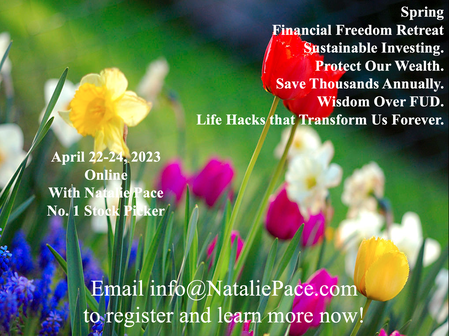 Join us for our Online Financial Freedom Retreat. April 22-24, 2023. Email [email protected] to learn more. Register with friends and family to receive the best price. Click for testimonials, pricing, hours & details. 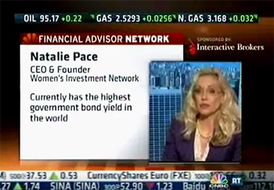 Natalie Wynne Pace is an Advocate for Sustainability, Financial Literacy & Women's Empowerment. Natalie is the bestselling author of The Power of 8 Billion: It's Up to Us and is the co-creator of the Earth Gratitude Project. She has been ranked as a No. 1 stock picker, above over 835 A-list pundits, by an independent tracking agency (TipsTraders). Her book The ABCs of Money remained at or near the #1 Investing Basics e-book on Amazon for over 3 years (in its vertical), with over 120,000 downloads and a mean 5-star ranking. The 5th edition of The ABCs of Money was released on September 17, 2021. Natalie Pace's easy as a pie chart nest egg strategies earned gains in the last two recessions and have outperformed the bull markets in between. That is why her Investor Educational Retreats, books and private coaching are enthusiastically recommended by Nobel Prize winning economist Gary S. Becker, TD AMERITRADE chairman Joe Moglia, Kay Koplovitz and many Main Street investors who have transformed their lives using her Thrive Budget and investing strategies. Click to view a video testimonial from Nilo Bolden. Check out Natalie Pace's Apple Podcast. Watch videoconferences and webinars on Youtube. Other Blogs of Interest Rebalance By the End of March Solar, EVs, Housing, HSAs -- the Highest-Yield in 2023? Are You Anxious or Depressed over Money? Why We Are Underweighting Banks and the Financial Industry. You Stream all the Channels. Should You Invest, Too? NASDAQ is Still Down -26%. Are Meta & Snap a Buy? 2023 Bond Strategy Emotions are Not Your Friend in Investing Investor IQ Test Investor IQ Test Answers Bonds Lost -26%, Silver Held Strong. 2023 Crystal Ball for Stocks, Bonds, Real Estate, Cannabis, Gold, Silver. Tilray: The Constellation Brands of Cannabis New Year, New Healthier You Tesla's $644 Billion Fall From Mars Silver's Quiet Rally. Free Holiday Gift. Stocking Stuffers Under $10. Cash Burn & Inflation Toasted the Plant-Based Protein Companies Save Thousands Annually With Smarter Energy Choices Is Your FDIC-Insured Cash Really Safe? Giving Tuesday Tips to Make Your Charitable Contribution a Triple Win. Is Your Pension Plan Stealing From You? The FTX Crypto Fall of a Billionaire (SBF). Crypto, Gold, Silver: Not So Safe Havens. Will Ted Lasso Save Christmas? 3Q will be Released This Thursday. Apple and the R Word. Yield is Back. But It's Tricky. The Real Reason Why OPEC Cut Oil Production. The Inflation Buster Budgeting and Investing Plan. No. Elon Musk Doesn't Live in a Boxabl. IRAs Offer More Freedom and Protection Than 401ks. Will There Be a Santa Rally 2022? What's Safe in a Debt World? Not Bonds. Will Your Favorite Chinese Company be Delisted? 75% of New Homeowners Have Buyer's Remorse Clean Energy Gets a Green Light from Congress. Fix Money Issues. Improve Your Relationships. 24% of House Sales Cancelled in the 2nd Quarter. 3 Things to Do Before July 28th. Recession Risks Rise + a Fairly Safe High-Yield Bond DAQO Doubles. Solar Shines. Which Company is Next in Line? Tesla Sales Disappoint. Asian EV Competition Heats Up. 10 Wealth Strategies of the Rich Copper Prices Plunge Colombia and Indonesia: Should You Invest? 10 Misleading Broker/Salesman Pitches. Why are Banks and Dividend Stocks Losing Money? ESG Investing: Missing the E. Bitcoin Crashes. Crypto, Gold and Stocks All Crash. The U.S. House Decriminalizes Cannabis Again. The Risk of Recession in 6 Charts. High Gas Prices How Will Russian Boycotts Effect U.S. Multinational Companies? Oil and Gas Trends During Wartime Russia Invades Ukraine. How Have Stocks Responded in Past Wars? 2022 Crystal Ball in Stocks, Real Estate, Crypto, Cannabis, Gold, Silver & More. Interview with the Chief Investment Strategist of Charles Schwab & Co., Inc. Stocks Enter a Correction Investor IQ Test Investor IQ Test Answers What's Safe in a Debt World? Money Market Funds, FDIC, SIPC: Are Any of Them Safe? My 24-Year-Old is Itching to Buy a Condo. Should I Help Him? The 12-Step Guide to Successful Investing. Gardeners Creating Sanctuary & Solutions in Food Deserts. The Bank Bail-in Plan on Your Dime. Rebalancing Your Nest Egg IQ Test. Answers to the Rebalancing Your Nest Egg IQ Test. Important Disclaimers Please note: Natalie Pace does not act or operate like a broker. She reports on financial news, and is one of the most trusted sources of financial literacy, education and forensic analysis in the world. Natalie Pace educates and informs individual investors to give investors a competitive edge in their personal decision-making. Any publicly traded companies or funds mentioned by Natalie Pace are not intended to be buy or sell recommendations. ALWAYS do your research and consult an experienced, reputable financial professional before buying or selling any security, and consider your long-term goals and strategies. Investors should NOT be all in on any asset class or individual stocks. Your retirement plan should reflect a diversified strategy, which has been designed with the assistance of a financial professional who is familiar with your goals, risk tolerance, tax needs and more. The "trading" portion of your portfolio should be a very small part of your investment strategy, and the amount of money you invest into individual companies should never be greater than your experience, wisdom, knowledge and patience. Information has been obtained from sources believed to be reliable. However, NataliePace.com does not warrant its completeness or accuracy. Opinions constitute our judgment as of the date of this publication and are subject to change without notice. This material is not intended as an offer or solicitation for the purchase or sale of any financial instrument. Securities, financial instruments or strategies mentioned herein may not be suitable for all investors. Comments are closed.
|
AuthorNatalie Pace is the co-creator of the Earth Gratitude Project and the author of The Power of 8 Billion: It's Up to Us, The ABCs of Money, The ABCs of Money for College, The Gratitude Game and Put Your Money Where Your Heart Is. She is a repeat guest & speaker on national news shows and stages. She has been ranked the No. 1 stock picker, above over 830 A-list pundits, by an independent tracking agency, and has been saving homes and nest eggs since 1999. Archives
July 2024
Categories |






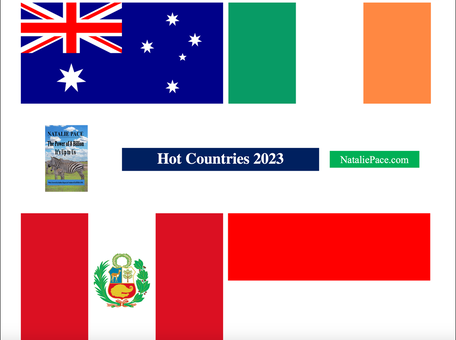
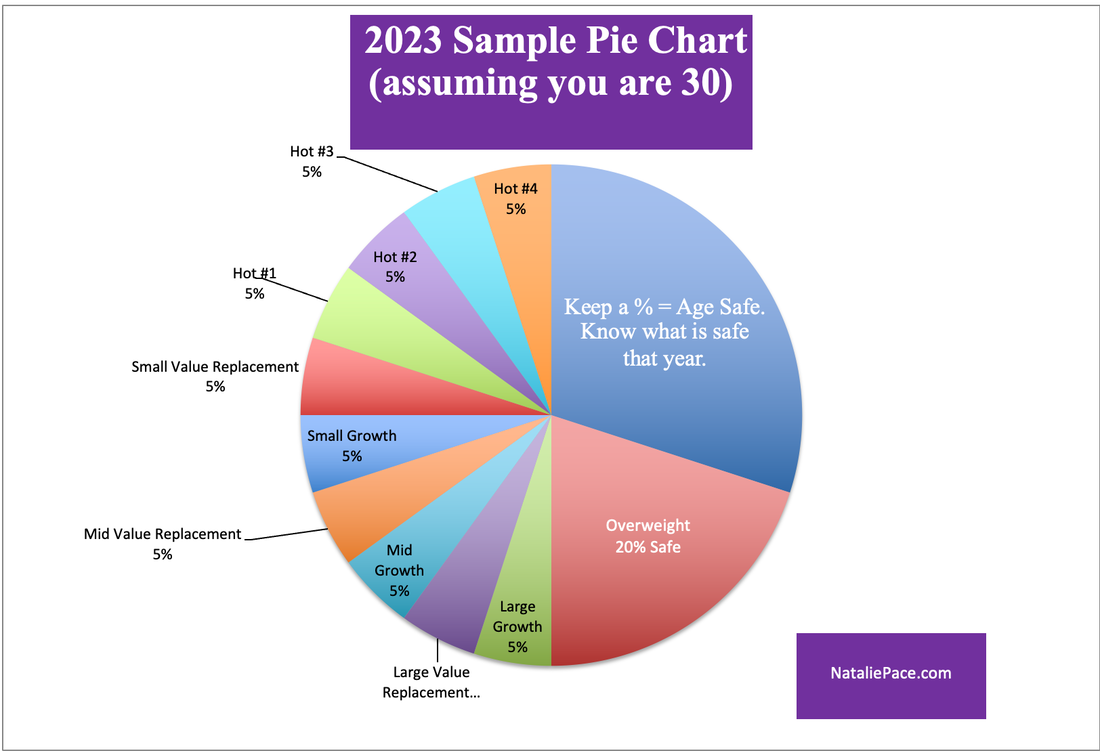
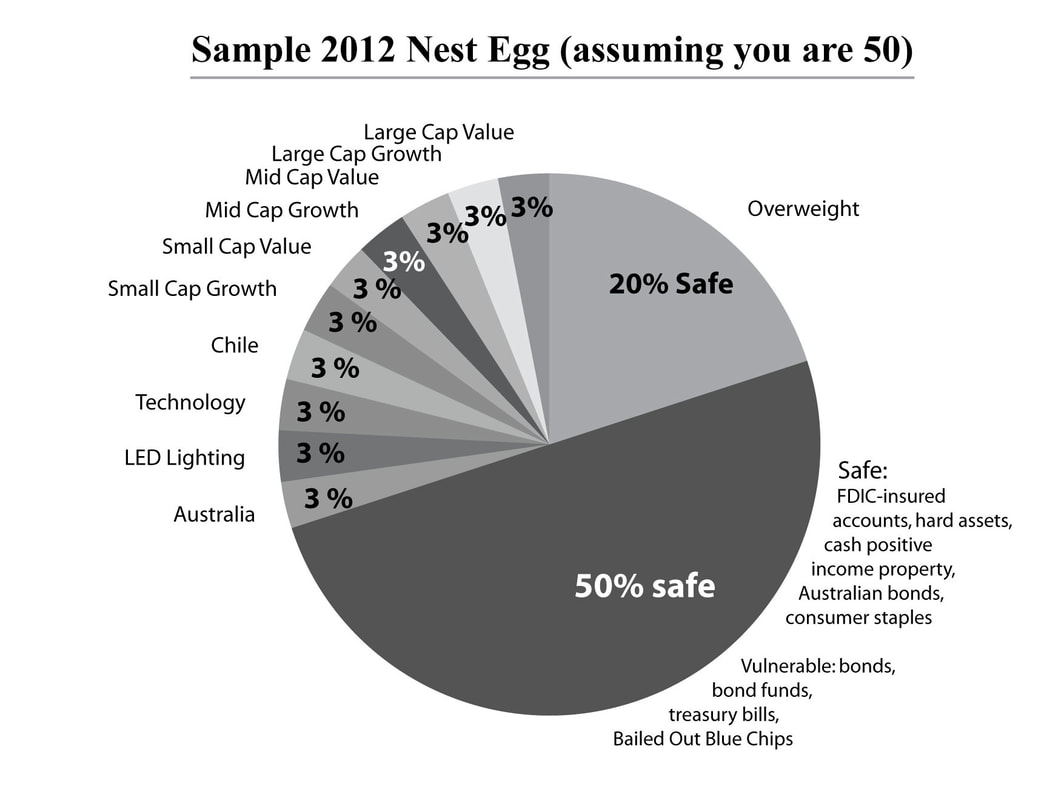
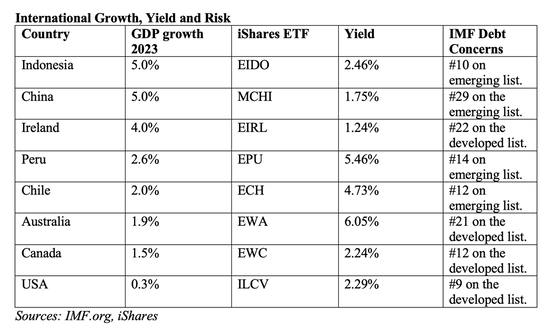
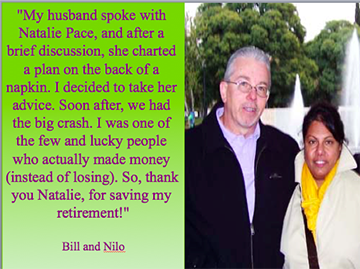
 RSS Feed
RSS Feed